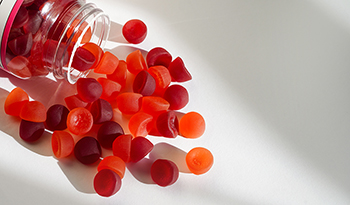Добавки для прискорення метаболізму: Підбадьорюємось здоровим способом

Чи є ваш метаболізм двигуном спалювання калорій у вашому тілі? Хоча метаболізм часто визначають саме так, насправді це надто спрощене визначення. Ваша швидкість метаболізму - це відображення загальної суми всіх частин ВАС , які працюють у синергії. Іншими словами, ваш метаболізм відіграє багато складних ролей і на нього впливають гормони, нейромедіатори та інші хімічні речовини у вашому організмі. Я хочу сказати, що ви не можете прискорити метаболізм, просто випивши таблетку або вийшовши на пробіжку - все набагато складніше.
Метаболізм - це низка хімічних процесів, які відбуваються в усіх клітинах організму. Це відбувається, коли ви сидите і дивитеся телевізор, коли ви спите, і коли ви сидите за робочим столом протягом дня. Більша частина енергії, яку ви спалюєте, надходить від основного, або спочиваючого, обміну речовин - це всі дії, що відбуваються у ваших клітинах, щоб підтримувати вашу життєдіяльність. Підраховано, що 60-80% ваших щоденних енерговитрат припадає на основний метаболізм, а не на фізичну активність.
Від чого залежить швидкість мого метаболізму?
Метаболізм варіюється від людини до людини. Навіть дві людини одного розміру можуть мати дуже різну швидкість метаболізму. Хтось може повністю відмовитися від їжі і не набирати вагу, в той час як інший повинен мати більш стратегічний підхід до схуднення. Дослідники все ще працюють над тим, щоб виявити всі фактори, які визначають швидкість метаболізму. Що ми точно знаємо, так це те, що на ваш метаболізм впливає кількість м'язів і жиру у вашому організмі, ваш вік і ваша генетика. Те, що ви жінка, має значення ще й тому, що ваш метаболізм коливається в різні періоди менструального циклу.
Залози, які впливають на обмін речовин
Існує три залози, про які слід знати, коли йдеться про метаболізм: Наднирники, щитовидна та підшлункова залози.
Залози є важливими органами вашого тіла, які роблять все: від регулювання і виділення слини, сліз і грудного молока до створення і вивільнення гормонів та інших хімічних речовин, які можуть допомогти вашому метаболізму регулювати стрес, вагу і апетит. Коли гормони, що виробляються наднирниками, щитовидною та підшлунковою залозами, виходять з рівноваги, це призводить до порушення метаболізму. Отже, перша мета - переконатися, що ці три залози збалансовані і працюють злагоджено. Давайте подивимось на це ближче.
Щитовидна залоза та наднирники - це органи, які відповідають за вироблення та вивільнення інших гормонів у вашому організмі, а також беруть участь у регулюванні вашого метаболізму, який включає вашу вагу та рівень енергії. Щитовидна залоза, розташована біля основи шиї, є дуже важливою залозою для жінок, оскільки вона виробляє гормони, які регулюють спалювання калорій, загальну вагу, енергію, настрій і багато іншого. Надниркові залози - їх у вас дві, по одній над кожною ниркою - виробляють гормони стресу адреналін (також відомі як адреналін і норадреналін) і кортизол. Крім того, що ці гормони регулюють і контролюють дисбаланс ваги та фертильність, вони також впливають на рівень стресу, втоми, тривожності та фертильності.
Підшлункова залоза виробляє гормон інсулін та інші травні ферменти, які розщеплюють (метаболізують) їжу, особливо ліпазу, яка підтримує баланс жирів у вашому організмі. Підшлункова залоза розташована між шлунком і хребтом, а також частково за шлунком. Він має довжину близько шести дюймів і форму пуголовка. У традиційній медицині підшлункову залозу часто ігнорують, але в традиційній китайській медицині (ТКМ) підшлункова залоза розглядається як важливий учасник травлення.
Мої найкращі поради щодо прискорення метаболізму
Уникайте додавання цукру. Це ворог номер один для вашого метаболізму. Якщо ви споживаєте занадто багато цукру, інсулін, що виробляється підшлунковою залозою, може вийти з ладу і призвести до уповільнення метаболізму. Це допомагає бути уважним до кількості цукру в солодощах, напоях, заправках і соусах. Намагайтеся обмежити споживання цукру до 25 грамів (менше 3 чайних ложок) на день.
Знизьте споживання солі. Не вживайте більше 1500 мг натрію на добу. Сіль впливає на роботу гормону інсуліну у вашому організмі, подібно до цукру. Почніть читати етикетки на продуктах харчування. Вміст натрію завжди вказується на етикетці упакованих продуктів. Максимально вживайте свіжі цільні продукти, включаючи м'ясо, курку, овочі та фрукти, щоб знизити рівень натрію.
Дотримуйтесь інтервалу голодування. Це легко, тому що він здебільшого спить вночі. Не їсти протягом певної кількості годин - хороша стратегія для прискорення метаболізму. Даючи кишечнику відпочити, ви запобігаєте перевантаженню калоріями. Продовжіть свій природний нічний піст на кілька додаткових годин, щоб не їсти протягом 12-14 годин. Це дає вашому тілу можливість спалювати накопичені калорії та жир! Ставтеся до кухні, як до ресторану, і влаштовуйте їй “відкриті” і “закриті” години. Ставте собі за мету закрити кухню о 18:00 і не відкривати її до 6:00-8:00 наступного ранку!
Принеси заліза. Залізо необхідне для оптимальної роботи щитовидної залози, воно допомагає організму виробляти поживні речовини, переносити кисень до клітин і може сприяти спалюванню жиру. Подумайте про те, щоб додати 15-30 мг елементарного заліза до свого щоденного раціону.
Приймайте селен. Селен допомагає підтримувати належне функціонування щитовидної залози, тому розгляньте можливість додавання 200 мкг в якості щоденної дози.
Пийте матчу. Доведено, що зелений чай прискорює метаболізм, але матчу має перевагу над зеленим чаєм, оскільки являє собою цілий лист зеленого чаю, подрібнений у порошок. Це робить матчу джерелом переваг зеленого чаю, включаючи велику кількість антиоксидантів особливо поліфенолів катехінів, які можуть стабілізувати рівень цукру в крові (баланс інсуліну). У ньому також багато клітковини .
Приймайте вітаміни групи В. Ці вітаміни відіграють потужну, але часто недооцінену роль у вашому здоров'ї. Це ключові мікроелементи, які беруть участь у регулюванні всіх гормональних шляхів і нейромедіаторів, а це означає, що ці вітаміни відіграють важливу роль у регулюванні ваги та апетиту, енергії, настрою тощо. Нижче наведено рекомендовану мною кількість найбільш важливих вітамінів . Вітаміни групи В:
- B1 (тіамін)25 мг і B5 (пантотенова кислота), 50 мг: Допомагає організму перетворювати їжу на паливо та метаболізувати жири і білки.
- B2 (рибофлавін)25 мг: Також допомагає організму перетворювати їжу на паливо.
- B6 (піридоксин), 50 мг: Допомагає організму виробляти нейромедіатори для нормального розвитку та функціонування мозку, стабілізує настрій.
- B12 (кобаламін)1,000 мкг: Сприяє підвищенню енергії.
- Фолієва кислота800 мкг: Знижує ризик вроджених вад розвитку, захищає від анемії.
- Біотин2 500 мкг: Сприяє зміцненню та потовщенню волосся і нігтів.
Додайте L-карнітин до свого раціону. Ця амінокислота природним чином виробляється у вашому організмі, допомагаючи виробляти енергію. Добавка L-карнітин може допомогти при резистентності до лептину або нездатності регулювати апетит. Я рекомендую приймати 1000 мг на день.
ВІДМОВА ВІД ВІДПОВІДАЛЬНОСТІ:Інформація, що міститься в Центрі здоров'я, не призначена для встановлення діагнозу...
















































































 Зміст
Зміст
















